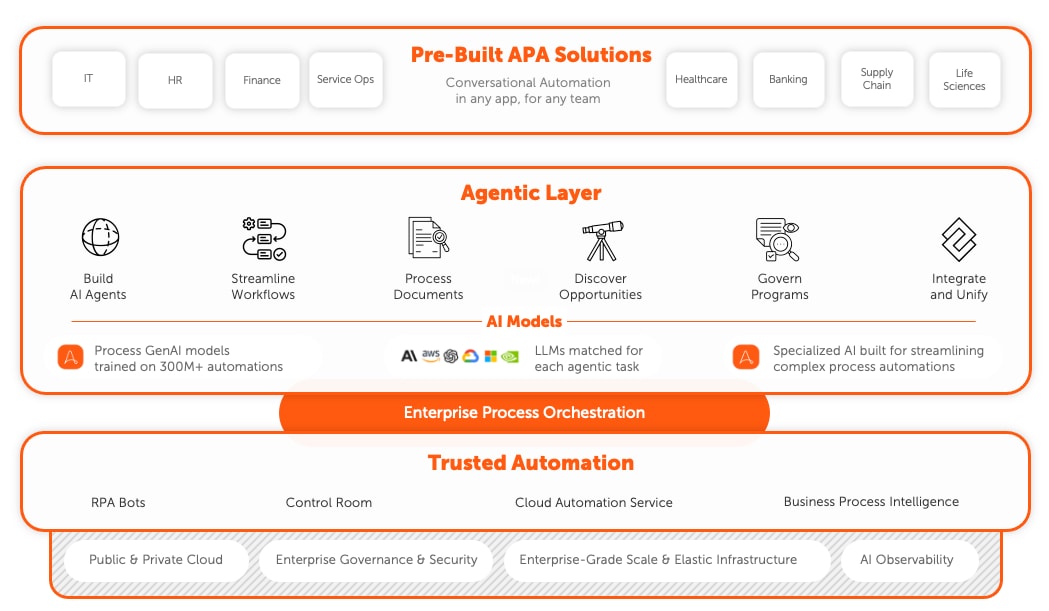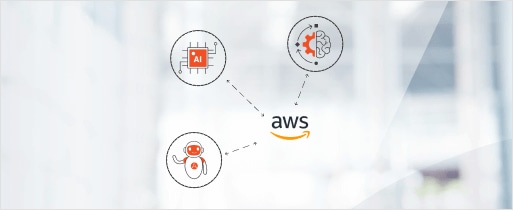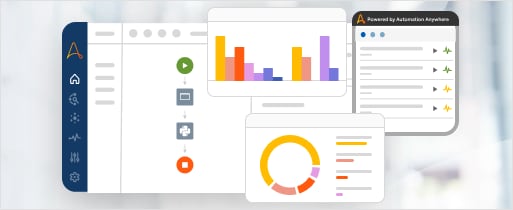The benefits of Intelligent Automation.
Intelligent Automation expands the possibilities of business process automation, creating unlimited opportunities to reimagine how your business operates.
Increase productivity
Automate repetitive tasks so employees can focus on high-value strategic work.
Save money
Boost efficiency across the organization, reducing costs and providing quick ROI.
Make better decisions
Connect and integrate systems to improve data capture and retrieval.
Enhance customer experience
Deliver faster response times, greater accuracy, and more consistent results.
Improve adaptability
Scale with complete adherence to security and compliance requirements.
How does Intelligent Automation work?
Intelligent Automation combines AI's brainpower with automation's muscle to transform complex business processes, adapt, and learn. It spans the entire automation journey—discovery, automation, optimization—seamlessly connecting and interacting with humans, systems, and data.
To achieve end-to-end automation capabilities, Intelligent Automation harnesses AI technologies such as computer vision, natural language processing (NLP), machine learning (ML), and generative AI, making it possible to automate processes that rely on unstructured data or complex information sources, or that don’t follow a structured workflow.
These AI tools are seamlessly integrated with Robotic Process Automation (RPA) to take action and execute process steps. AI technologies set up the appropriate actions, analyze the output of business processes to deliver insights, and guide RPA on next steps. Then, they close the loop with continuous feedback and learning to improve and optimize. Intelligent Automation drives a cycle of continuous feedback and learning aimed at refining—and ultimately transforming—operations.
Process transparency
AI-powered discovery surfaces clear, precise insights into the business process areas to optimize.
Data mastery
Intelligent Automation dissects and understands complex data landscapes, recruiting the right data for the right task.
Process integration
Seamless interoperability and integrations connect disparate enterprise systems for barrier-free, efficient process workflows.
Strategic decision-making
Predictive analytics enable Intelligent Automation to anticipate and navigate complexities.
Coordinating process steps
Orchestration ensures all the moving parts of business process automation are perfectly timed and executed.
Adaptive learning
Machine learning powers constant refinement of responses and actions for process and performance optimization.
Automation assistants
Application-embedded generative AI accelerates every process and empowers employee productivity.
What to look for in an Intelligent Automation solution.
Evaluating Intelligent Automation solutions? The right Intelligent Automation solution will make it easy for business users and automators alike to automate across documents, data, and systems, with human involvement. Enterprise solutions empower responsible AI with built-in governance and guardrails to harness both built-in models as well as integrate with any AI, including generative AI large language models (LLMs). It should seamlessly integrate with existing tools and systems, scale to handle any workload and adapt to future requirements. At the foundational level, an enterprise platform will offer security, privacy, and compliance certifications that reflect the evolving reality of global business operations. Cost, support and training, and the reputation of the vendor are also important considerations.
Process discovery
Process discovery is a cornerstone of Intelligent Automation solutions that allows organizations to uncover, comprehend, and analyze existing processes. By identifying inefficiencies and bottlenecks, organizations can improve operations, reduce costs, and maximize efficiency. Process discovery accelerates automation initiatives by providing the intelligence needed for informed decision-making and effective streamlining of processes. When fully integrated within an Intelligent Automation solution, process discovery provides the ability to pinpoint areas ripe for optimization and ensures rapid and precise process transparency, feeding directly into autopilot-led automation creation.
Robotic Process Automation (RPA)
RPA capabilities play a central role in Intelligent Automation solutions. RPA is instrumental in automating repetitive digital tasks, facilitating efficiency, precision, and resilience in business processes. It mimics human actions across systems, allowing teams to offload repetitive tasks. These capabilities become even more valuable when combined with AI and APIs, empowering both professional and citizen developers to build end-to-end automations.
Integrations
Integration capabilities are the driving force behind a comprehensive Intelligent Automation solution, allowing smooth interoperability, scalability, and data exchange, and supporting the need for secure and compliant operations. Acting as the bridge between systems and applications, integrations facilitate seamless data exchange and connectivity, which is critical for end-to-end process automation within an organization's ecosystem. Like the sturdy supports scaling up a cloud infrastructure, integration capacities ensure automation workflows can interact comprehensively with a multitude of business applications, APIs, and databases, thus catalyzing real-time data flows and actions. Look for Intelligent Automation platforms that offer pre-existing connectors and packages that enable instant connection with an array of business applications and systems, accelerating the pace of automation development and deployment. By allowing the reuse of automation assets enterprise-wide, integrations reduce duplication efforts while driving consistency.
Intelligent Document Processing (IDP)
IDP allows organizations to accurately and efficiently process documents at scale. It can extract, classify, validate, and incorporate data from various document types directly into automated workflows. Enterprise-grade IDP can lead to lower cost of ownership by reducing the time required to configure document extraction projects. With pre-built document models and the integration of cutting-edge AI technologies directly into the flow of work, IDP not only plays a pivotal role in end-to-end automations, it also enhances the overall efficiency and efficacy of Intelligent Automation.
Generative AI (GenAI)
Central to Intelligent Automation, generative AI empowers organizations to automate intricate tasks necessitating a high degree of human-like decision-making and ingenuity. Generative AI and large language models (LLMs) extend the capabilities of Intelligent Automation and, critically, Intelligent Automation platforms enable the secure, responsible use of generative AI by providing governance and guardrails. With generative AI seamlessly integrated within an Intelligent Automation solution, employees can use natural language to request automations across systems, generate personalized content, and summarize dense documents, without leaving their preferred application. Generative AI also serves to unlock more document data and accelerate automation development.
Scale supported by the cloud
Scaling your operations is crucial for adapting to growth and evolving business needs. Intelligent Automation is designed to expand in response to an increase in process volume and a growing number of users. This flexibility allows businesses to efficiently manage a high volume of tasks without sacrificing performance. Effective orchestration is vital for overseeing multiple automations concurrently, an essential capability for large enterprises with numerous processes. Leveraging cloud-based solutions enhances this flexibility and scalability. By utilizing a cloud-native architecture, businesses can reduce costs related to infrastructure, maintenance, security, and compliance. The cloud model supports automatic scaling to meet demand and continuous updates, and includes high availability and disaster recovery options. In addition, an extensible cloud-native SaaS platform makes it straightforward to extend capabilities across departments and teams, accommodating everyone from citizen developers to digital assistants.
Security, privacy, and compliance
A comprehensive Intelligent Automation solution will adhere to a multilayered security framework that includes implementing robust cloud security practices, identity and access management (IAM) protocols, data encryption techniques, and rigorous logging and monitoring systems. It's vital for Intelligent Automation platforms to meet regulatory compliance standards relevant to different industries. Look for platforms that align with GDPR for data protection, employ encryption for sensitive information, and offer secure cloud storage options. Adherence to key certifications like ISO 27001, SOC 1 & 2 Type 2, and HITRUST underlines a platform's commitment to security and compliance. Additionally, built-in audit trails and transparent reporting mechanisms ensure accountability and compliance across all automation activities, while governance features enable precise control over who accesses and modifies automation setups.
Intelligent Automation use cases by industry.
Discover opportunities for innovation and improved efficiency across all industries.
Financial Services
Mitigate risks by strengthening security, compliance, and controls to ensure financial resilience in today's volatile markets.
Healthcare
Alleviate burnout among healthcare professionals, improve patient experience, and ensure security and compliance with evolving regulations.
Manufacturing
Eliminate waste and increase agility, while reducing costs, speeding up time-to-market, and discovering new opportunities for innovation.
Life Sciences
Fuel innovation and operational agility by streamlining workflows that accelerate pharmacovigilance (PV) and complaint handling.
The evolution of Intelligent Automation.
How automation evolved beyond RPA to empower end-to-end business transformation.
Getting started
Automation tools have come a long way in a short time. The first big development was document processing. Businesses could accelerate document creation and remove paper processes by automatically capturing, extracting, and processing data from different document types.
Getting things done
Robotic process automation (RPA) then added digital workers to the toolkit. RPA excelled at repetitive and manual tasks, such as billing, coding invoices, and sending reminders. It could be used to mimic human inputs in real time and perform faster and more accurately than human counterparts.
Getting smart
Intelligent Automation took this to the next level by incorporating cognitive technologies. With machine learning and computer vision, businesses could automate the previously impossible, such as unstructured data. “Hyperautomation” emerged too—essentially, the ability to automate the automation.
Making change
Digital transformation is, of course, a journey. So, what’s next? According to McKinsey, generative AI will be a key driver of innovation and growth. By combining automation with generative AI, businesses could do even more to increase productivity. Think complaint resolution, sentiment analysis, invoice processing, and more.
How does Intelligent Automation work?
Unleash the full potential of your workforce with the power of automation and AI. Discover how Intelligent Automation works and take the first step in streamlining operations and boosting productivity.
Discover
You can’t automate what you don’t understand. Quickly and securely discover the fastest path to process optimization and business ROI with Process Discovery. Get fast, accurate, and secure visibility on how your business operates and which processes can be automated to kickstart your Intelligent Automation journey.
Automate
With a detailed blueprint of business processes in hand and prioritization out of the way, it's time to automate. Start with small tasks, or use generative AI to create ready-to-launch, end-to-end automations in no time. Intelligent Automation will help you align business units, teams, workers, and processes to support overall goals and strategies.
Scale
Once the initial benefits have been realized, it’s time to scale your Intelligent Automation program. Flexible, cloud-native automation accelerates transformation, and CoE Manager helps teams govern, track, and measure automation program performance. Analytics and insights also help identify new value generators and empower citizen developers to massively expand automations for more impact.
Engage
Intelligent Automation helps bridge technology islands, unlock speed and agility, and connect people, processes, and data. How? By integrating disparate tools, applications, and systems. Real-time access to data and insights makes it easier for teams to collaborate, ultimately improving operational speed and agility and unlocking innovation.
The Agentic Process Automation System.
Select an intelligent automation solution to support the many facets of your transformation journey including your workforce, integration with existing systems, security and scale.

Frequently asked questions.
How does Intelligent Automation compare to RPA?
Intelligent Automation can be defined as RPA + AI technologies. Intelligent Automation incorporates the rule-based execution of RPA within a broader AI-powered automation suite.
How does Intelligent Automation work?
Intelligent Automation is powered by advanced artificial intelligence (AI) and mimics human inputs in real time by incorporating RPA, machine learning, reasoning, problem-solving, and natural language processing.
Can you use Intelligent Automation and RPA together?
Absolutely...RPA is just one component of Intelligent Automation. Think of Intelligent Automation platforms like Automation Anywhere as a one-stop-shop for digital transformation that covers every step of the automation process, from discovery to measurement. Within the suite of powerful Intelligent Automation tools, RPA is a core capability that mimics human actions to interact with digital systems, applications, and data.
What are some applications of Intelligent Automation?
Intelligent Automation allows businesses across industries to enhance efficiency, accuracy, and decision-making capabilities by streamlining almost any complex process. It could be used to handle routine customer queries, analyze financial data, improve the accuracy of forecasting, automate order processing, and manage administrative tasks.
Does Intelligent Automation require users to know how to code?
Coding expertise is not required. Automation Anywhere offers Intelligent Automation tools that are intuitive and user-friendly, so that any employee can use them. While other automation solutions may not offer simple tools for non-specialists, we believe in empowering employees without coding knowledge to drive fundamental digital change.
How does Intelligent Automation save employees time?
Intelligent Automation performs complex tasks quickly and accurately, freeing employees to do more meaningful, fulfilling, and higher-quality work. Plus, they can focus on tasks and initiatives that make a greater impact on the bottom line. It also breaks down barriers between systems, meaning employees can access the data they need faster.
What departments can benefit from Intelligent Automation?
Intelligent Automation is designed to be embraced by every department across the entire organization. From HR to finance and from front- to back-office, artificial intelligence can boost productivity and reduce costs. When every department is optimized, the business as a whole gains an unrivaled competitive advantage.







